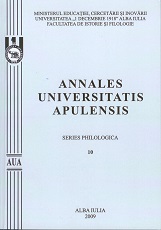Ioachim Crăciun şi militanismul istoriografiei clujene interbelice
Ioachim Crăciun and the militant activity of the interwar historiography of Cluj
Author(s): Liviu ZgârciuSubject(s): History
Published by: Editura Mega Print SRL
Keywords: the Great Union; December 1; 1918; Transylvania; the historical right; nationalism; revisionism; the interwar historiography
Summary/Abstract: The act that took place on the 1st of December 1918 marked the beginning of a period of maximum prosperity of the Romanian culture that was – unfortunately – suddenly interrupted by the Communist regime and never experienced again. History had given political satisfaction to the Romanian people after a long period of expectations and extraordinary sacrifice. This meant the liberation out of the reunion political obsession, as far as the interwar generation of intellectuals is concerned, but also the act of addressing new questions about the way in which the man of culture was about to serve the interests of the Romanian nation starting with this moment. The problem of the legitimation of these decisions was constantly raised for discussion on the background of the post-war changes which placed Romania on the side of the countries that were favoured by the provisions of the peace treaties signed in Paris. Within this context, the historian was aware about the fact that his role was not completely played up to the 1st of December 1918. It went on and continued to support the state and the society. The historian provided them with arguments that were useful from a political point of view, such as those arguments similar with the “historical right” as means of supporting the national interests. This attitude was characteristic to all historians of Cluj, no matter if they were part of “the first line” of the Romanian historiography represented by Ioan Lupaş or Alexandru Lapedatu, or the second one. Ioachim Crăciun was part of the second category, and his contribution to the Romanian historiography is hardly known and analysed nowadays mainly because he distinguished himself especially in the field of bibliology. Nevertheless, Ioachim Crăciun’s historical activity cannot be neglected because most of his works were carried out during the interwar period; they focused on themes of political, cultural and ecclesiastical history, and represented a significant contribution brought to the Romanian historiography. Most of his historiographical concerns focused on the intra-Carpathian province, because - just like the other historians of Cluj, he considered the study of the history of Transylvania a fundamental issue. Historiography underwent just a shifting or a transfer process from the area of the extremely militant attitude placed into the service of the political unity towards areas into which the militant spirit is more subtle. It is the reason why several studies written by Ioachim Crăciun employed this type of approach after the year 1918. His forms of militant attitude are directly connected with the school of Cluj where he came from. Cluj was the place where the militant attitude was mostly employed as consequence of both the Transylvanian realities marked by ethnical and religious diversity and the still vivid memories of those Transylvanian historians who became conversant with the school policy of Magyarization before 1918.
Journal: Annales Universitatis Apulensis Series Historica
- Issue Year: 13/2009
- Issue No: 1
- Page Range: 171-181
- Page Count: 11
- Language: Romanian
- Content File-PDF

